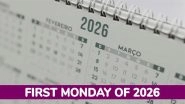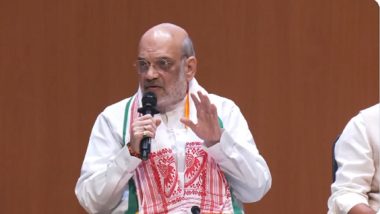New Delhi, May 26: Union Home Minister Amit Shah has said a Uniform Civil Code for the entire country will be implemented within the next five years after extensive consultations with all stakeholders if the BJP returns to power. In a wide-ranging interview with PTI, Shah said the Modi government in its next term will also implement 'One Nation, One Election' as the time has come for the elections to be held simultaneously in the country.
The senior BJP leader further said the simultaneous elections will also bring down costs. Asked about the possibility of moving elections to winter or some other time of the year as against the current one being held in scorching heat, Shah said, "We can think over it. If we prepone one election, it can be done. It should be done. This is also the time of students' vacation. It creates lots of problems too. Over time, the election (Lok Sabha) gradually moved to this period (during summer)." PoK is Ours and We Will Take It: Amit Shah
Talking about the Uniform Civil Code, Shah said, "The UCC is a responsibility left to us, our Parliament and the state legislatures of our country since independence by the makers of our Constitution." "The guiding principles decided for us by the Constituent Assembly include the Uniform Civil Code. And even at that time, legal scholars like K M Munshi, Rajendra Babu, Ambedkar Ji had said that there should not be laws based on religion in a secular country. There should be a Uniform Civil Code," he said.
The Union Home Minister said the BJP has done an experiment in Uttarakhand where it has a majority government as it is a subject of states and the Centre. The UCC has been on the BJP's agenda since the 1950s and recently it was enacted in BJP-ruled Uttarakhand."I believe that the Uniform Civil Code is a huge social, legal, and religious reform. The law made by the Uttarakhand government should undergo social and legal scrutiny. Religious leaders should also be consulted," he said.
"What I mean is that there should be an extensive debate on this. And if there is anything to change in the model law made by the Uttarakhand government after this extensive debate. Because someone will definitely go to court. The judiciary's opinion will also come. "After that, the state legislatures and Parliament of the country should think seriously over this and a law must be enacted. That is why we have written in our 'sankalp patra' that the BJP aims to have a Uniform Civil Code for the entire country," he said. "PM Modi Has Already Won 310 Seats Till the 5th Phase of Lok Sabha:" Amit Shah
Asked if it can be done within the next five years, Shah said it will be done in this period only. "Five years are a sufficient period," he said. Asked about simultaneous polls, Shah said, "We will also make every effort to achieve 'One Nation, One Election'. This should also be discussed." "The Prime Minister had formed the Ram Nath Kovind committee. I was also a member of it. Its report has been submitted. The time has come that elections should be held simultaneously in the country," he added.
Asked whether a bill on this can be introduced in the next session if the BJP returns to power, Shah said, "Our resolution is for five years. We will bring it during this period." In its manifesto for the ongoing Lok Sabha polls, the BJP has said that Article 44 of the Constitution lists Uniform Civil Code as one of the Directive Principles of State Policy. "BJP believes that there cannot be gender equality till such time Bharat adopts a Uniform Civil Code, which protects the rights of all women, and the BJP reiterates its stand to draw a Uniform Civil Code, drawing upon the best traditions and harmonising them with the modern times," the manifesto has said.
On 'One Nation, One Election', the BJP manifesto mentioned that the Modi government had set up a high-powered Committee to examine the issues of conducting simultaneous elections and it will work towards the implementation of the recommendations of the committee. It has also promised to make provisions for a common electoral roll for all levels of elections.












 Quickly
Quickly


